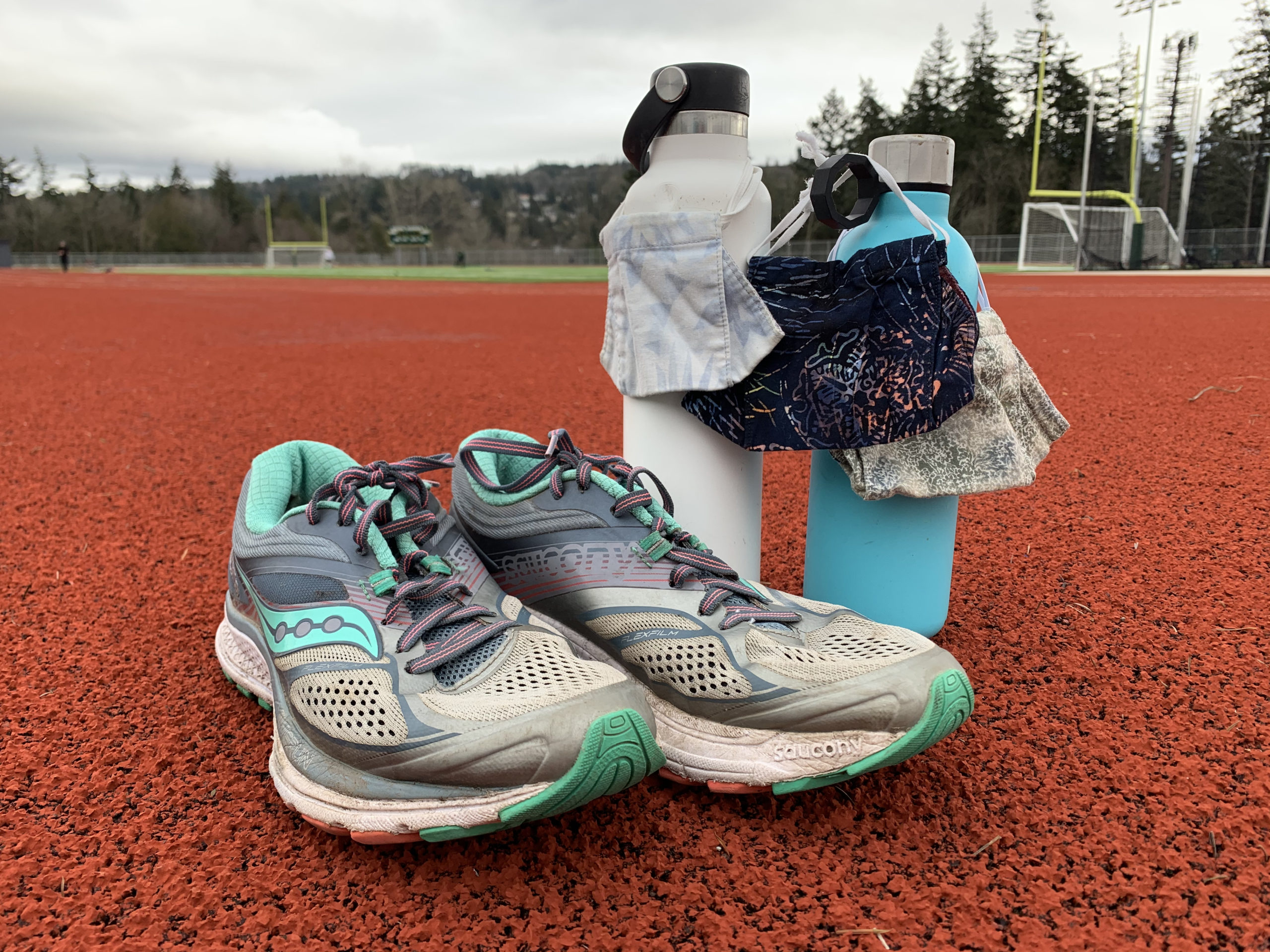Water bottles, running shoes and several masks placed on an outdoor track PJ Heusted // AS Review
By Annika Taylor
Student athletes are accustomed to making sacrifices but giving up a season of their respective sport usually isn’t one of them.
When I learned last March that the Great Northwest Athletic Conference [GNAC] cancelled the Outdoor Track and Field Championships, I was devastated. I had come right out of the indoor season, the first competition season in college that I felt proud of, and was in the best shape that I had ever been in. Dedication to improving resulted in hours of training and miles of running, dedication for an opportunity that was now taken away.
I resented that my training was for nothing.
Fast-forward to fall quarter, I, like many of my classmates, felt mentally and emotionally drained from COVID-19 related stressors and the political turmoil of the summer. I was tired of running alone and grateful for any sort of structure and social interaction I could get.
I’d never been happier to show up at the track at three o’clock for a structured practice with my teammates.
My teammates and I were required to take confusing and ever-changing precautions. They were eventually narrowed down to a COVID-19 test once every two weeks and a daily symptom survey through the Student Health Center.
In addition to the annual National Collegiate Athletic Association paperwork to be signed, there was a new form from the university that stipulated that if we did get COVID-19, Western could not be held liable. On the same page was a list of other responsibilities that athletes agreed to including the standard mask wearing and maintaining six feet of social distance. I knew that perhaps at the track these precautions could be managed but not on off-campus runs. Even with these reservations I signed anyway. I was so used to signing paperwork that it must have not bothered me.
If I could trust my teammates to do the right thing outside of practice then when we did come together everything would be fine. I failed to consider how long the pandemic would last, and that putting one’s health in the hands of others is not the wisest choice.
On Jan. 27 I received an email from Vice President for Enrollment and Student Services Dr. Melynda Huskey explaining that in-person practices would be suspended for two weeks. Only days before this email I had been notified of athletes on my team contracting COVID-19 along with a call from the Student Health Center asking where and with whom I had been the previous week.
An entity that I had never found personally threatening once suddenly was.
According to the email from Dr. Huskey if infection trends continued then the first three weeks of winter quarter would have more cases of COVID-19 on campus than the entirety of fall quarter, with athletes being disproportionately represented.
If it is true that athletes are overrepresented among positive cases, then we have to ask why.
Are athletes not following the guidelines that all individuals with an on-campus presence are held to? Are they choosing to ignore them?
As competition for golf, softball, basketball and track and field resume these questions are even more relevant. In addition to a COVID-19 test every two weeks, athletes must now also be tested three days before travel to competitions. The first track and field meet is scheduled for Mar. 20 at Seattle Pacific University and competition for the other sports started Feb. 26.
I don’t believe that athletes on average are less responsible than the general student body, nor do I believe that it is strictly an individual’s fault for contracting COVID-19, but I do think that athletes need to stop viewing athletics as a right and instead as a privilege. Practicing and competing is not a default to be pursued at high costs.
If COVID-19 cases are rising disproportionately among student athletes, then athletics should be suspended or canceled until control measures can be demonstrated as effective.
The choice to practice and compete in-person now affects the present and future well-being of every one of our coaches, teammates, housemates and community members. We must ask ourselves if it is worth it.
Is it worth practicing when most classes are still remote? Is it worth practicing if athletes are contributing as much as they are to Western’s positive COVID-19 numbers?
If it is then we must prove it. We must prove that the return to competition is safe and not just something that the administration has granted out of guilt. Otherwise, members of our community will wonder why we have been given this privilege when others haven’t and question what they have been told about student athletes. We are coached to be our best, expect the best from our teammates and competitors and play by the rules.
As student athletes we are used to making sacrifices. We get up early, stay up late, balance academics, training, work and try to have social lives. It’s a difficult balance that we asked for, that we wanted.
We must be prepared to make another kind of sacrifice. It is a sacrifice that is selfless but will protect ourselves and our community. The choice to not practice requires hope and faith, commodities that are all lacking a bit now. We must have faith that the pandemic will end and hope that when it does, we will all have the heart and lungs to get back to work.
The biggest threat to getting back to practice and competition as normal is not COVID-19, but how Vikings choose to deal with it.

